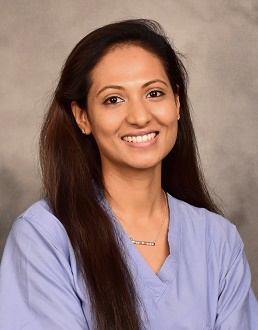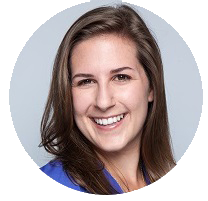Pooja Swamy, MD
Inspired to pursue cardiology by family history and the ability to have an impact, this fellow is also passionate about prevention.
 Pooja Swamy, MD, is an interventional cardiology fellow at Ascension St. John Hospital (Detroit, MI). She completed her medical schooling at Bangalore Medical College in India, and then came to the United States to pursue training through an internship in internal medicine and pediatrics at Geisinger Medical Center (Danville, PA), a residency in internal medicine at Wayne State University/Detroit Medical Center (Detroit, MI), and a cardiovascular disease fellowship at Loma Linda University (Loma Linda, CA). Swamy is passionate about intravascular imaging, coronary physiology, complex coronary interventions, peripheral vascular interventions, percutaneous treatment of deep vein thrombosis/pulmonary thromboembolism, and management of cardiogenic shock. She also focuses on clinician wellness and healthy living. Upon completion of her training this summer, she plans to move back to Southern California and practice as an academic and interventional cardiologist.
Pooja Swamy, MD, is an interventional cardiology fellow at Ascension St. John Hospital (Detroit, MI). She completed her medical schooling at Bangalore Medical College in India, and then came to the United States to pursue training through an internship in internal medicine and pediatrics at Geisinger Medical Center (Danville, PA), a residency in internal medicine at Wayne State University/Detroit Medical Center (Detroit, MI), and a cardiovascular disease fellowship at Loma Linda University (Loma Linda, CA). Swamy is passionate about intravascular imaging, coronary physiology, complex coronary interventions, peripheral vascular interventions, percutaneous treatment of deep vein thrombosis/pulmonary thromboembolism, and management of cardiogenic shock. She also focuses on clinician wellness and healthy living. Upon completion of her training this summer, she plans to move back to Southern California and practice as an academic and interventional cardiologist.
Why did you decide to pursue interventional cardiology?
Cardiovascular disease is quite prevalent in Southeast Asians. Unfortunately, despite a healthy lifestyle, my grandfather passed away at the age of 52 from a large MI due to having limited access to immediate cardiac care in South India. As a child, I saw how much my father missed my grandfather, a man who was revered by the community. This impacted me deeply and motivated me to pursue medicine, and then further on train to become a cardiologist. I would not be completely honest if I did not also mention that I wanted to fulfill the dream of my academically gifted mother to become a physician. At the beginning of my fellowship, I never considered a career in interventional cardiology, instead wanting to pursue adult congenital heart disease. As I spent more time in the lab learning the intricacies of interventional cardiology, I had several encounters where I witnessed the impact one could make as an interventional cardiologist with a wide skill set, knowledge, aptitude, quick wit, and the ability to be innovative with the tools that are available. To me, as a physician, there is neither a greater joy nor anything more humbling than the feeling when you meet the family of a patient whose life you saved or helped have a better quality of life.
What kind of research are you interested in conducting?
The management cardiogenic shock and intricacies of coronary physiology really piqued my interest quite early in my training. I’m thankful to my mentors at Ascension St. John who have provided me with the opportunity to participate in some revolutionary clinical trials. I’m currently a sub-PI in the DTU trial and have previously participated in the National Cardiogenic Shock Initiative in addition to other trials involving peripheral artery disease and pulmonary embolism. As I step into being a practicing interventional cardiologist, I would like to participate in clinical trials related to the management of cardiogenic shock and coronary microvascular disease.
What has surprised you most about becoming an interventional cardiologist?
Taking on interventional cardiology as a career, I assumed that I was prepared, as I had seen my husband go through the training and then leap into a successful practice. However, this year of training has instilled in me more humility and belief in the role an interventionist plays, not only in the lab but also before and often after the patient undergoes a procedure. As one of my mentors always says: “Procedural success cannot be equated to clinical success.” There are several of us interventional cardiologists who do believe firmly in primary and secondary prevention. Interventional cardiologists are not mere plumbers fixing blockages, pump failures, and leaky or tight valves. We are physicians who can do that with appropriately indicated procedures in addition to benefitting our patients with the use of optimal medical therapy. I also think that often people interpret interventional cardiologists as people who work like machines to exhaustion. This surely is a myth, as a lot of us strive to have a good work-life balance. It is surely a process, and I feel like there's a lot to learn from them.
How the pandemic affected your training pathway?
My husband, Aditya Bharadwaj, who is also an interventional cardiologist is my greatest pillar of support. We have two little children, who are 2 and 5 years old. This year has been the most challenging year for all of us, as I moved away from Southern California to Michigan to pursue my advanced training. Dealing with the nature and intensity of my training, adapting to a new institution, being transplanted three time zones away from home, and experiencing the social isolation of the pandemic all posed unique physical and emotional challenges for both my family and me. Now that I am at the threshold of graduating from my fellowship, I look back and see how well we overcame these challenges and how this year evolved all of us. I could not have done this without my wonderful husband, my two lovely understanding toddlers, our amazing nannies, and the unstinted support of my parents and in-laws.
For training, as far as COVID was concerned, our numbers definitely plummeted in the beginning of my fellowship. Case volumes, especially for PCI, dropped because the number of patients we could schedule went down and then when the hospital was at capacity with COVID-19 patients. In the latter half of my training, the numbers picked up as we were more adept with handling the peaks of infection. During this time, we saw a lot of COVID-related cardiopulmonary complications and participated in their management, especially with patients needing ECMO support with severe lung infection or depressed cardiac function. We saw a rapid surge in massive pulmonary embolism with COVID needing thrombectomy, as well. Training during the COVID era surely helped me gain more knowledge and also experience in managing these patients.
Did you gain a different perspective on medicine during this challenging time?
Yes, absolutely! It's always that if a door shuts on you then another opens. Despite a drop in the number of interventional volumes during the initial half of fellowship, which was the case across the nation, a plethora of online resources and platforms opened up focusing on training and fellow education. Several institutions and societies provided—and continue to provide—access to online educational resources for everybody, especially trainees, free or with minimal subscription. There are multiple webinars, training courses, and conferences that have waived fees, so the accessibility to all of this content improved and that was a welcome change. I think that was and is a great opportunity to tap into for all the trainees despite how the hands-on experience with some aspects of training went down. Also, the unpredictability of these times brought a greater realization in me that the most important things in life are to value our near and dear and to be kind to each other. Every life on the face of Earth has faced physical, emotional, economic, and social duress of variable intensity due to the pandemic. It is disheartening to recall the lives lost, of young and old, peers and loved ones. The only thing that unites us and brings us strength during this pandemic is the kindness and empathy we have for each other.
What’s the best piece of advice a mentor has given you?
I met Dr. Alex Truesdell at TCT before starting my fellowship and he said, “You will learn a lot of new and exciting things, but what's important in your interventional fellowship is enjoying every moment.” There were several people that I met through my training who questioned me wanting to pursue my passion, as it was “not conducive” for family life. Dr. Mamas Mamas made me realize that I should not give up my dream to pursue interventional cardiology because I was a woman and had a young family to raise. He made me realize that the hardship of training with my family situation will always be less painful than the regret of not pursuing my passion.
In the past year I’ve learnt the value of being a patient advocate, especially in the field of interventional cardiology. Drs. Amir Kaki and Theodore Schreiber have instilled in me and my co-fellows alike the value of striving for the best for your patient. This motivates me to be a better physician every day, for my patients and their loved ones. I would also like to mention what Dr. Antonious Attallah once told me: “Do not equate procedural success to clinical success” and “It’s not over until it’s over.”
What are you most looking forward to after you finish training?
Very honestly, going back to reunite with my family after a long but fruitful year of training. The second thing is that I want to see how it feels to be an interventional cardiologist without training wheels and see my growth as an early career physician.
What is something that people might not know about you?
First, I am a space science enthusiast and considered pursuing astrophysics and a career in space research if not for medicine. Second, I am passionate about photography, and I do hope to pursue that on a professional level at some point of my life. As an interventionist, via angiography, I may somewhat be living that passion of mine. Third, I love to learn new languages. I can speak three languages at an advanced level and two others fluently. I recently learned, and am still learning, French during the past 4 months of my interventional year.
What her nominator Antonious Attallah, MD (Ascension St. John Hospital, Detroit, MI), says:
Dr. Swamy is an excellent interventional fellow with a keen mind and an evidence-based medicine-driven ethos in pursuing outstanding care for her patients. She will make an excellent physician.
*To nominate a stellar cardiology fellow for the Featured Fellow section of TCTMD’s Fellows Forum, click here.
Yael L. Maxwell is Senior Medical Journalist for TCTMD and Section Editor of TCTMD's Fellows Forum. She served as the inaugural…
Read Full Bio

Comments